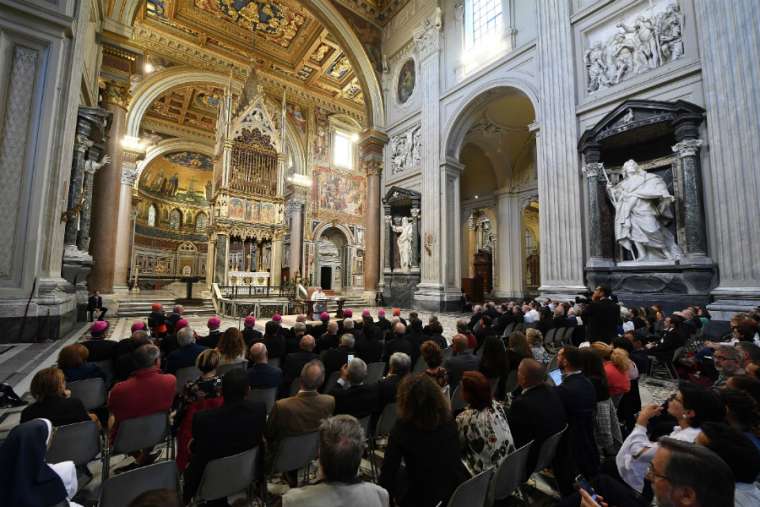ROME – Pope Francis has stressed the need for ongoing formation for couples, before and after marriage, saying that even the basic teachings of the Church “could not be taken for granted.” The pope spoke in an address to participants in a recent course on marriage and family life held in Rome.
Speaking Sept. 27 in the Archbasilica of St. John Lateran to an audience of priests, deacons, and lay people, Francis renewed his call for a “permanent catechumenate for the sacrament of marriage,” saying it was essential for couples to receive ongoing formation both before and after their wedding.
The course, which ran Sept. 24-26, was sponsored by the Diocese of Rome and the Roman Rota, the Church’s appellate court which primarily handles marriage nullity cases.
Francis has previously insisted on the need for better, longer, more comprehensive instruction for couples in his annual addresses to the Rota.
“The greater effectiveness of pastoral care is realized where the accompaniment does not end with the celebration of the wedding, but escorts them at least for the first years of married life,” the pope said.
Francis told the attendees that marriage was “a vast, complex and delicate apostolic field” which required the full energy and enthusiasm of the Church.
Praising the “courageous” witness of St. John Paul II on the family in the modern world, Francis said he sought to build upon the legacy of his “farsighted” predecessors through his reform of canon law in marriage nullity cases and in the pastoral application of his post-synodal apostolic exhortation Amoris Laetitia. The pope said the aim of both of these efforts was to address the “urgent” need for comprehensive marriage formation.
“Marriage is not just a ‘social’ event, but a true sacrament that involves an adequate preparation and a conscious celebration,” the pope said. “The marriage bond, in fact, requires an engaged choice on the part of the engaged couple, which focuses on the will to build together something that must never be betrayed or abandoned.”
The work of marriage preparation is, according to the pope, best achieved through joint efforts by priests and married couples, though he stressed the importance and preeminence of the role of the parish priest.
“Priests, especially parish priests, are the first interlocutors of young people who wish to form a new family and get married in the sacrament of marriage. The accompaniment of the ordained minister will help the newlyweds to understand that marriage between a man and a woman is a sign of the spousal union between Christ and the Church, making them aware of the profound meaning of the step they are about to make.”
The pope’s comments were heard by some as a corrective to recent remarks by Cardinal Kevin Farrell, prefect of the Dicastery for Laity, Family and Life. In July, Cardinal Farrell said that “priests are not the best people to train others for marriage” and that “they have no credibility.”
Francis emphasised that the work of preparing couples for marriage needed to include basic formation in the faith, noting that in many cases marriages broke down not because of any inherent problem with the couple, but simply because they lacked the depth of faith needed to live the sacrament fully.
“So many times the ultimate root of the problems that come to light after the celebration of the sacrament of marriage is to be found not only in a hidden and remote immaturity suddenly exploded, but above all in the weakness of the Christian faith,” Francis told the attendees.
“The more the journey of preparation is deepened and extended in time, the sooner the couples will learn to correspond to the grace and strength of God and will also develop the “antibodies” to face the inevitable moments of difficulty and fatigue of married and family life.”
The pope noted that those preparing couples for marriage could make no assumptions about the level of formation in the faith couples might have. Many, he said, “have remained stuck to some elementary notion of the catechism of the first Communion and, if all goes well, of Confirmation.” Because of this “it is essential to resume the catechesis of Christian initiation to the faith, whose contents are not to be taken for granted or as if they were already acquired by the engaged couple.”
Addressing these common gaps in couples’ understanding of the faith would, Francis explained, both help them understand the faith and instil “a filial sense of the Church.”
Above all, the pope stressed, priests and lay formators alike should welcome the opportunity to form couples over a period of years, not weeks, calling it an essential expression of the Church’s maternal concern.
“It is an experience of joyful motherhood, when newlyweds are the object of the attentive care of the Church which, in the footsteps of her Master, is a caring mother who does not abandon, does not discard, but approaches with tenderness, embraces and encourages.”
The pope also discussed the difficulties faced by couples whose unions did break down, noting that the first priority should be to revive their faith and help them “rediscover the grace of the sacrament,” though in some cases the Church needed offer equal support through the nullity process which was also pointed toward the salus animarum, or salvation of souls.
Francis finished by noting that he was pleased to see that his reforms of the nullity process had been widely adopted into practice. These, he said, were meant as an aid to bishops and judicial vicars in dioceses whose work in tribunals is to seek the truth and “to comfort the peace of consciences, especially the poorest and far from our ecclesial communities.”












